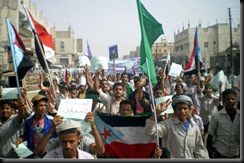As Yemen veers toward civil war, a look at the players that may determine the country's future.
BY BLAKE HOUNSHELL | MAY 26, 2011
ALI ABDULLAH SALEH
Elected president of what was then the Yemen Arab Republic in 1978, Saleh has ruled the country in one form or another for more than three decades, a task he famously likens to "dancing on the heads of snakes." Leaked U.S. diplomatic cables paint a picture of a wily survivor determined to enrich and empower his own family and friends at the expense of the nation. But declining oil revenues have made it harder for the president to sustain his tribal patronage network, and observers have warned for years that Saleh was losing his edge. (One 2009 cable quoted a member of parliament describing the president as "overwhelmed, exhausted by the war, and more and more intolerant of internal criticism.")
A lifelong military man (and rumored whiskey smuggler), Saleh is not thought to have completed elementary school -- and it shows. "Saleh has provided Yemen with relative stability relying on his maneuvering skills and strategic alliances, but has done little to strengthen government institutions or modernize the country," one 2005 cable reads. The president's eldest son, Ahmad Ali, heads the U.S.-backed special forces, and three of his nephews hold top military positions. The same leaked 2005 cable describes Ahmad Ali as "the most obvious choice" to succeed Saleh, but alludes to "considerable doubts as to his fitness for the job."

THE AL-AHMARS
In recent days, fierce fighting has broken out between Saleh's security forces and fighters loyal to Sadiq al-Ahmar, the head of the Hashid tribal federation, Yemen's second-largest such grouping. Sadiq took over three and a half years ago from his father Abdullah, the grand patriarch of the Hashids, who passed away in late 2007. Abdullah was a close ally of Saleh for many years, but his 10 sons have chosen to challenge the president as he has grown weaker. One son, Hussein, resigned from the ruling party in February and denounced Saleh as a "traitor." Another son, Hamid, one of Yemen's richest men, is a leading opposition politician with holdings in banks, telecommunications, and media companies. In 2009, according to a leaked diplomatic cable, Hamid told the U.S. Embassy in Sanaa of his wide-ranging plans to force Saleh out, promising "controlled chaos" along the Indonesian model. The embassy dismissed his claims.
Saleh is technically a member of the Hashids, through his Sanhan tribe. But family ties only go so far in Yemen: On Thursday, he ordered the Ahmar brothers' arrest.

ALI MOHSEN AL-AHMAR
"Reputedly the most powerful military man in the land," according to a 2005 embassy cable, Brig. Gen. Ali Mohsen al-Ahmar is the commander of the military's 1st Armored Division. He broke dramatically with Saleh in March, declaring his sympathy for the protesters' demands and vowing to protect them from government reprisals.
Although they are distant cousins, Mohsen has personal reasons to despise Saleh: In 2010, the Yemeni regime allegedly called in Saudi airstrikes against the general's headquarters (the Saudis apparently recognized the ruse in time). Many in Yemen also believe Ali Mohsen was charged with the impossible mission of putting down the northern Houthi rebellion, a task he performed with great brutality, in order to marginalize him.
Ali Mohsin may covet the presidency, a prospect that leaves analysts cold. Unlike in Tunisia and Egypt, the military is not a cohesive institution -- "it is actually very tribalized," according to Khaled Fatteh, a Yemen expert at St. Andrews University. "It is not an organization that can take over the responsibility of transition."

JOINT MEETING PARTIES
The blandly named JMP is Yemen's official opposition, a fractious coalition formed in 2002 and comprised of five parties as well as a few independents. Together, they won nearly 60 of 300 parliamentary seats in the last election in 2003, but much has changed in the intervening years. The largest bloc is Al-Islah, an Islamist party dominated by the al-Ahmar family, other northern tribesmen, and the Yemeni Muslim Brotherhood. One prominent member is Abdul Majid al-Zindani, a hard-line Salafist preacher who was named a "specially designated global terrorist" by the U.S. Treasury Department in 2004.
The JMP also includes the Yemeni Socialist Party (YSP), the former ruling party of South Yemen, and three smaller parties: the Islamist Al-Haq, the Nasserists, and the Popular Forces Union. With the backing of the Gulf Cooperation Council, the JMP for weeks has been trying to broker a deal for Saleh to step down, but that deal has now fallen apart and has been denounced by protest leaders.

THE SOUTHERN MOVEMENT
The dog that hasn't barked -- so far -- during the uprising is Yemen's separatist movement, the legacy of the country's failed experiment with socialism and still-unresolved questions dating back to the country's 1994 civil war. North and South Yemen were separate countries until 1990, when the collapse of the Soviet Union gave Saleh room to broker a unity accord, with the backing of Iraq's Saddam Hussein. The loose southern movement, led initially by retired general Nasir Ali al-Nuba, first appeared in 2007, demanding equal treatment vis-à-vis the comparatively wealthier north, which dominates Yemen's government, economy, and military. Since then, its demands have escalated, and some are pushing for outright secession. In 2009, Nasser al-Wahayshi, the leader of al Qaeda's Yemen branch, announced his support for an independent Islamic emirate in the south, a goal that doesn't seemed to be broadly shared in the south. The Southern Movement has pledged its support to the anti-Saleh protesters, but is using the movement to push for autonomy within a federal system.
http://www.foreignpolicy.com/articles/2011/05/26/who_s_who_in_yemen?page=full
